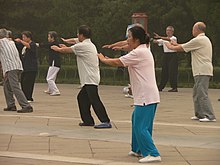 Exercise boosts brain function at all ages. This means that for both young and old, it is worth it to get out and engage in physical activity.
Exercise boosts brain function at all ages. This means that for both young and old, it is worth it to get out and engage in physical activity.
A large study reviewed other studies (for a total of 258,279 persons) on effects of exercise on brain functioning. They found that exercise, even light exercise, boosts brain function (specifically general cognition and executive function) and memory. Executive function refers to mental processes (executive functioning skills) that help you solve problems, make plans, set and carry out goals, and manage emotions.
The researchers concluded that most forms of exercise appear effective, including light-intensity activities, and even yoga, Tai Chi, and walking. The positive effects were found at all ages, and in all groups studied. There seemed to be an especially strong effect in persons with ADHD
From Science Daily: Exercise of any kind boosts brainpower at any age
Whether it's an early morning jog, or a touch of Tai Chi, groundbreaking research from the University of South Australia shows that any form of exercise can significantly boost brain function and memory across children, adults, and older adults. ...continue reading "Exercise Boosts Brain Function At All Ages"

